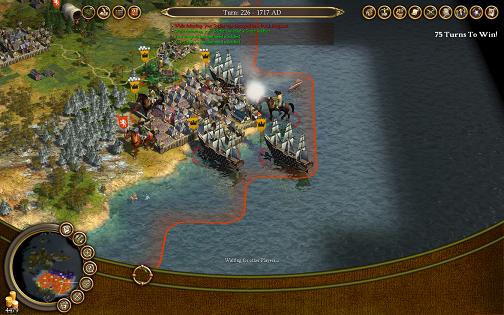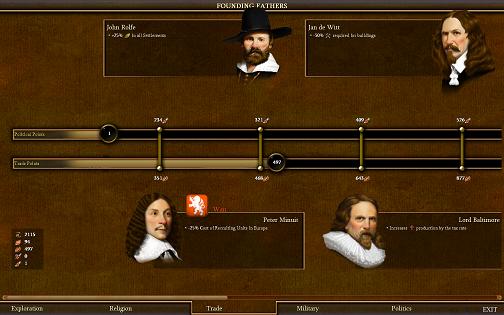
For a game that now claims membership of the Civilization family, Colonization lacks the breadth, depth, variety and sheer richness of its more famous cousins and is the poorer game for it. For one thing, it covers only a narrow slice of history, from 1492 to 1792 to be exact and despite its generic name, it covers only the colonization of the Americas. Folks who might have wanted a game that covers the colonization of Africa or Asia for example will have to walk away disappointed. For another thing, while there are many paths to prosperity, there is only one route to victory: successfully declaring independence from your mother nation and defeating their forces on the battlefield.
You start the game with a motley group of colonists out to make a new life in the New World. Unlike the Civilization games, you get a naval unit as part of your initial force, so you’re expected to spend some time exploring to find the best spot for your first settlement. Again, unlike Civilization, you’ll inevitably find that while the New World is indeed a vast land filled with riches, the best spots are already occupied by the native indians, so there is potential from conflict right from the beginning.
Choosing how best to manage that conflict and grow your fledgling colony into a prosperous and powerful nation depends on your choice of nation and leader. The Spanish for example, have an innate bonus to attacking natives, so they’ll likely just grab land from the indians by force and destroy their settlements when they angrily declare war in response. The French on the other hand start with good relations with the natives so they will take care not to offend them and cultivate them to become trading partners and military allies.
While exploring the newly discovered continent is a good source of starting cash because the friendly natives seem to just love giving expensive presents to the first European nation to visit their villages, most of your money will have to be made by exporting goods back to Europe. Instead of producing abstracted food, hammers or coins as in the Civilization games, colonists in Colonization work the land to produce several specific types of raw materials: food, timber, tobacco, cotton, fur, silver, ore and sugar. Of these, food and timber are required to feed your colonists and construct buildings respectively. Ore is processed into tools, needed for more advanced buildings and ships, and then into guns.
Of the rest, while it is possible to export them to Europe for some quick cash, it is far more profitable to process them into finished goods. This means that if you have a settlement next to a tile that shows a cotton bonus on it, you might assign a harvester to work that tile for its cotton and another worker to the Weaver’s Shop in the settlement to turn the resulting cotton into cloth for export. Naturally, you’ll also need to have one or more farmers or fishermen in the settlement to provide enough food for everyone. With the exception of food, each of your settlements can only hold a limited quantity of each type of resource and you’ll have to build warehouses to increase your storage capacity. Since resources can be transported around in ships and wagons, you can even collect resources in one settlement and then transport them to another for processing.
This actually constitutes the meat of the gameplay making it much more of an economics and logistics management game than a 4X game. You’ll want to either sell your goods or send them to another city before it overflows out of your warehouses, but at the same time you want to avoid selling raw materials as much as possible. Since many colonists come with specific skills or weaknesses, you’ll also have to manage how they’re allocated to each of your settlements. A Master Carpenter for example constructs buildings very quickly but consumes timber at a prodigious rate in order to do so, so you’ll want to assign him to settlements with plenty of timber and where the construction work is most urgent. Natives who have been converted into colonists are good at gathering raw materials from the land, but bad at working in factories to process them so you’ll have to arrange them accordingly.
There are also other types of specialists. Firebrand Preachers can be assigned to churches and subsequently cathedrals to generate crosses. This helps to increase the flow of immigrants from Europe. Jesuit Missionaries can be spent to establish a religious mission in a native settlement which can then periodically generate a Converted Native for your colony. Elder Statesmen can be assigned to town halls to generate liberty bells. This has the dual effect of enlarging your cultural borders and boosting revolutionary sentiment.
The gold you get can then be spent on buying useful things like guns, cannons, ships and most importantly, additional colonists with specialized skills, from Europe. However, it will soon be obvious that your monarch regards you basically as a piggy bank and doesn’t hesitate to tax you and even demand the occasional gift. Basically, the more you export, the higher your tax rate becomes until there is almost no point in selling them to Europe, at which point it is usually time to start your revolution.
One of the primary criticisms against this game and one that I share is that to declare a revolution, you need to raise your revolutionary sentiment by generating liberty bells. However, this also causes your monarch to boost the size of the Royal Expeditionary Force that be will sent to crush your fledgling nation. In fact, if you slowly accumulate liberty bells throughout the game, you’ll inadvertently boost the size of the REF to ridiculous proportions which is why many players try not to generate any liberty bells at all until after they are ready for independence and then generate a whole lot at once in one huge burst.

Another problem is that you can always see the size of the REF at any time and once they attack, there are no surprises at all. They almost always attack in the same direction and either you’ve built up a strong enough military at that point to beat back the REF and win the game or you lose. This feels like you spend the whole game building up for the final confrontation, leaving all the action at the tail end of the game. None of your other industries and specialists even matter once the revolution starts. The economic management part itself is extremely micromanagement intensive and for me at least, not very enjoyable.
Finally, there is just very little variety in the gameplay. With so few nations to choose from, a very limited tech tree in the form of the Founding Fathers and only a single path to victory, there is not much point in replaying this game. The entire experience is also very American-centric to the detriment of game balance. For example, when you declare independence, you’re supposed to draft a constitution by choosing your nation’s stand on a number of moral principles. Is it a coincidence that choosing freedom over slavery and the right to bear arms as opposed to controlled arms are far and away the best choices?
As it is, it’s not a bad game. If you like a game that’s all about minutely overseeing a complex logistics web and you don’t mind micromanagement, by all means go for it. However, it’s a very lightweight game by Civilization standards and probably won’t appeal to most 4X strategy fans.
Hmm, well…I agree it’s a very different game from Civilization, and it’s a far more limited game. That, to me, makes up some of its charm. Short, yes, but it’s also a bit like a movie, a shorter adventure. To me, that makes it quite enjoyable. I’ve always been one of those for whom Civlization tends to drag on after some time. Then again, that’s just my playstyle.
I think I’ve found that I’m a bit overwhelmed by all of the options in Civilization, and that you have to make some choices before others or become an unviable empire later in the game. Here, the game is a bit simpler, and it knows what it is. You’re right, it’s more of an economics-management game than a 4X game…well…
Civilization is pretty heavy on the economics too, but it’s not as overt. It’s more beneath the surface. You have to balance the economics of production and city placement instead of the economics of trade goods. You have to maximize production between all of your buildings and units, balancing them accordingly. And when you’ve got 10 cities, that doesn’t come easily. I generally found that, in Colonization, it was simple for each of my few cities to have some specializations in terms of production. I had a city that mined a lot of silver, one that made cigars, one that made cloth, and so on.
Then again, I’ve not played a lot of 4X, and found a lot in the 4X genre that just boggled me. It’s possibly the lightweight aspects of Colonization that I liked…that, and the fact that it’s a very heavily story-driven game in a lot of respects. I think it does a good job of establishing its atmosphere.